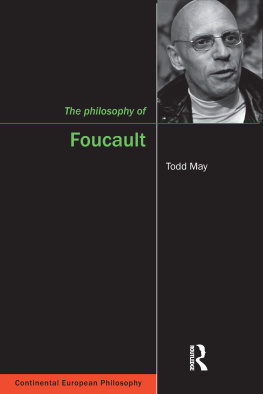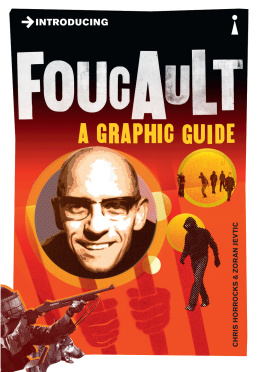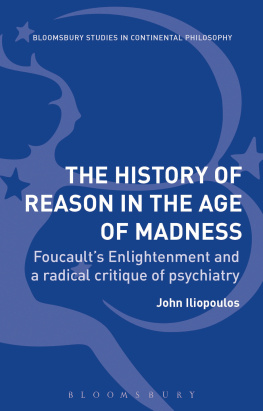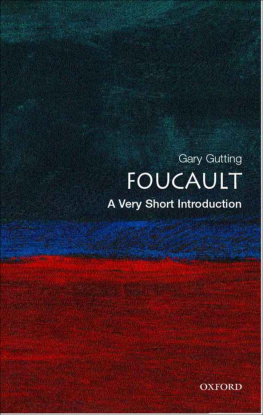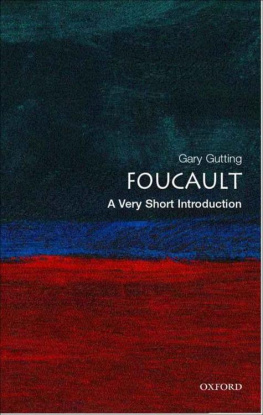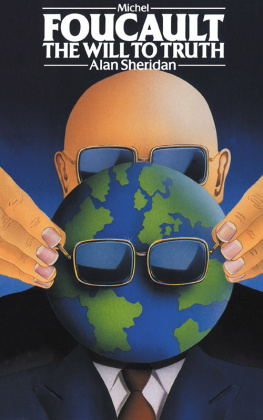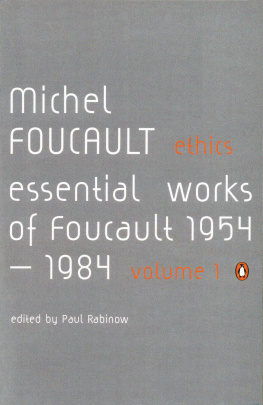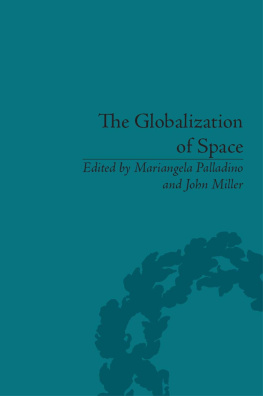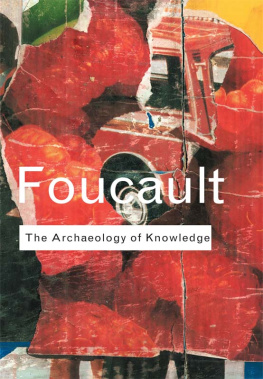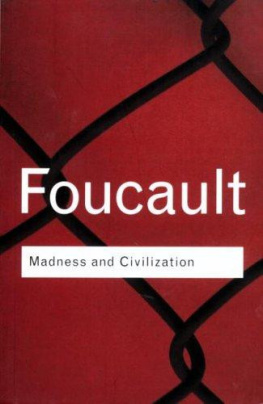Foucault Michel - Foucault and the Politics of Rights
Here you can read online Foucault Michel - Foucault and the Politics of Rights full text of the book (entire story) in english for free. Download pdf and epub, get meaning, cover and reviews about this ebook. City: Stanford;California, year: 2015, publisher: Stanford University Press, genre: Politics. Description of the work, (preface) as well as reviews are available. Best literature library LitArk.com created for fans of good reading and offers a wide selection of genres:
Romance novel
Science fiction
Adventure
Detective
Science
History
Home and family
Prose
Art
Politics
Computer
Non-fiction
Religion
Business
Children
Humor
Choose a favorite category and find really read worthwhile books. Enjoy immersion in the world of imagination, feel the emotions of the characters or learn something new for yourself, make an fascinating discovery.

- Book:Foucault and the Politics of Rights
- Author:
- Publisher:Stanford University Press
- Genre:
- Year:2015
- City:Stanford;California
- Rating:4 / 5
- Favourites:Add to favourites
- Your mark:
- 80
- 1
- 2
- 3
- 4
- 5
Foucault and the Politics of Rights: summary, description and annotation
We offer to read an annotation, description, summary or preface (depends on what the author of the book "Foucault and the Politics of Rights" wrote himself). If you haven't found the necessary information about the book — write in the comments, we will try to find it.
Foucault and the Politics of Rights — read online for free the complete book (whole text) full work
Below is the text of the book, divided by pages. System saving the place of the last page read, allows you to conveniently read the book "Foucault and the Politics of Rights" online for free, without having to search again every time where you left off. Put a bookmark, and you can go to the page where you finished reading at any time.
Font size:
Interval:
Bookmark:
FOUCAULT AND THE POLITICS OF RIGHTS
BEN GOLDER
STANFORD UNIVERSITY PRESS
STANFORD, CALIFORNIA
Stanford University Press
Stanford, California
2015 by the Board of Trustees of the Leland Stanford Junior University. All rights reserved.
No part of this book may be reproduced or transmitted in any form or by any means, electronic or mechanical, including photocopying and recording, or in any information storage or retrieval system without the prior written permission of Stanford University Press.
Printed in the United States of America on acid-free, archival-quality paper
Library of Congress Cataloging-in-Publication Data
Golder, Ben, author.
Foucault and the politics of rights / Ben Golder.
pages cm
Includes bibliographical references and index.
ISBN 978-0-8047-8934-9 (cloth : alk. paper)ISBN 978-0-8047-9649-1 (pbk. : alk. paper)
1. Human rightsPhilosophy. 2. Foucault, Michel, 19261984Political and social views. I. Title.
JC571G623 2015
323.01dc23
2015019552
ISBN 978-0-8047-9651-4 (electronic)
Typeset by Bruce Lundquist in 10/14 Minion Pro
For Emily
CONTENTS
ACKNOWLEDGMENTS
Over the course of writing this book I have accrued a significant number of personal and institutional debts. The following thanks are an insufficient attempt to repay these debts, but I shall try anyway.
Work on the manuscript commenced in earnest while I was the recipient of a Law School Research Fellowship at the Faculty of Law, University of New South Wales (UNSW), and continued while I was on sabbatical in 2012, hosted first at the University of Technology, Sydney (UTS) Faculty of Law and then at the Center for the Study of Law & Society at Boalt Hall, UC Berkeley. I am deeply grateful for the hospitality and the institutional and intellectual support provided by my hosts at both these institutions. I am also very grateful to Chrissie, Robert, and Alister for housing, feeding, and looking after us all in California.
Parts of the manuscript were first presented as seminar papers at a number of universities and research institutes. I am grateful to the organizers of the relevant seminar series or workshop for the invitation to present this work, and to the audience on each occasion for their critical engagement with it. These institutions include: Birkbeck College School of Law, Julius Stone Institute (University of Sydney); Socio-Legal Research Centre (Griffith University); UNSW Law, Institute for International Law and the Humanities (University of Melbourne); UTS Faculty of Law, Centre for Post-Colonial and Globalisation Studies (University of South Australia); and the Legal Intersections Research Centre (University of Wollongong). Parts of the manuscript were also presented at meetings of the following conferences: the American Political Science Association (Seattle and Washington DC), the Foucault Circle (Alberta and Malm), the Law and Society Association of Australia and New Zealand (Wellington), the Australian Society of Legal Philosophy (Melbourne), and the Australasian Society for Continental Philosophy (Brisbane).
Some of the ideas worked out in greater depth in the following pages, and often in very different directions, were first broached in the following publications: Foucault and the Unfinished Human of Rights, Law, Culture and the Humanities 6, no. 3 (2010): 35474; Foucaults Critical (Yet Ambivalent) Affirmation: Three Figures of Rights, Social & Legal Studies 20, no. 3 (2011): 283312; Foucault, Rights, and Freedom, International Journal for the Semiotics of Law 26, no. 1 (2013): 521; and What Is an Anti-Humanist Human Rights?, Social Identities 16, no. 5 (2010): 65168.
Several friends and colleagues were very generous with their advice and support at the beginning of the project. These include Eve Darian-Smith, Stuart Elden, Peter Fitzpatrick, Colin Gordon, Bonnie Honig, Martin Krygier, Bronwen Morgan, Pat OMalley, Austin Sarat, Miguel Vatter, and Karen Zivi. Some of these scholars and others had draft chapters inflicted upon them and cheerfully bore the imposition; these include Stuart Elden, Peter Fitzpatrick, Colin Gordon, Bonnie Honig, Martin Krygier, Jane McAdam, Daniel McLoughlin, Pat OMalley, and Karen Zivi. I am particularly grateful to Marcelo Hoffman, Samuel Moyn, Paul Patton, and Jessica Whyte, each of whom read the draft manuscript in its entirety and made a range of criticisms and suggestions for improvement. I was blessed to have as peer reviewers Colin Koopman and Samuel Chambers, who read the manuscript on behalf of Stanford University Press. They have been, in print and in person, unfailingly incisive in their critiques and consistently generous in their suggestions for reading and revision. This book also bears the imprint of sustained conversations about not just Foucault but the politics of rights more broadly with three friends in particular. I have learned more from Daniel McLoughlin, Illan rua Wall, and Jessica Whyte than it is possible to explicitly record here, although the pages that follow do so implicitly, I believe. I have benefited in innumerable ways from the vibrant collegiality, intellectual culture, camaraderie, and good sense of my colleagues in the Gilbert + Tobin Centre of Public Law as well as UNSW Law more broadly. Among the contributions of many excellent colleagues, the sustaining friendship of Michael Handler since I started at UNSW Law deserves special mentionthanks for everything, Mike. Thank you, finally, to Emily-Jane Cohen at Stanford University Press for her support of the project and her excellent editorship, and to Dr. John Golder (Dad) for his excellent editing of the manuscript.
It is customary in these pages to thank ones immediate family for granting a reprieve from the routines of parental life, and for allowing an absent academic parent conveniently to remove him or herself to an attic in the home stretch. Certainly I need to thank Mum and Dad again for their love over the years (and for so reliably and beautifully caring for my children over the last six in particular). But in reality I cannot thank Phoebe and Leo for going away because, thankfully, they went nowhere. And let me go nowhere. While not versed in the finer points of Foucault (although like all children they are active and rambunctious rights claimants), Phoebe and Leo animate the pages that follow and give meaning to the work it represents. But when all is said and done, it is their mother for whom every word is written and who makes it all possible. Like the last one and the next, this book is dedicated to her with all my love and thanks.
INTRODUCTION
I try to consider human rights in their historical reality while not admitting that there is a human nature.
Michel Foucault
The Impossible Object of a Foucauldian Politics of Rights?
The anthropologist Clifford Geertzs well-known review of Michel Foucaults Discipline and Punish in the New York Review of Books in 1978 opens with the following tart, yet characteristically acute, observation:
Michel Foucault erupted onto the intellectual scene at the beginning of the Sixties with his Folie et draison, an unconventional but still reasonably recognizable history of the Western experience of madness. He has become, in the years since, a kind of impossible object: a nonhistorical historian, an anti-humanistic human scientist, and a counter-structuralist structuralist.
It could not have been apparent to Geertz in 1978, but today, with the benefit of hindsight, we might add to his list of putative paradoxes the even more surprising figure of Foucault the political defender of rights. Indeed, as many readers of Foucault have noticed in the thirty-seven years since Geertzs review, something quite remarkable happens in Foucaults work from the mid- to late 1970s onward. Having made up to that point in his career a series of powerful critiques of the philosophical presuppositions of rights, Foucault begins increasingly to make appeals to the discourse of rights. He does so in philosophical work that engages with rights as a subject of analysis, but also in more directly political texts such as his often co-signed or collaboratively authored activist statements, interviews, and journalistic interventions. What may account for this puzzling shift from an iconoclastic anti-humanism and imperviousness to rights talk to a seemingly liberal defense of the classical Enlightenment tradition (of the rights of prison inmates, sexual minorities, asylum seekers, and many more besides)and this in such a staggeringly short period of time? What happens to Foucault in this interim? Does he recant and revise his former critical positions, acceding to a liberal politics of rights, or is there something else at work in the later body of work, in this curious Foucauldian
Next pageFont size:
Interval:
Bookmark:
Similar books «Foucault and the Politics of Rights»
Look at similar books to Foucault and the Politics of Rights. We have selected literature similar in name and meaning in the hope of providing readers with more options to find new, interesting, not yet read works.
Discussion, reviews of the book Foucault and the Politics of Rights and just readers' own opinions. Leave your comments, write what you think about the work, its meaning or the main characters. Specify what exactly you liked and what you didn't like, and why you think so.

